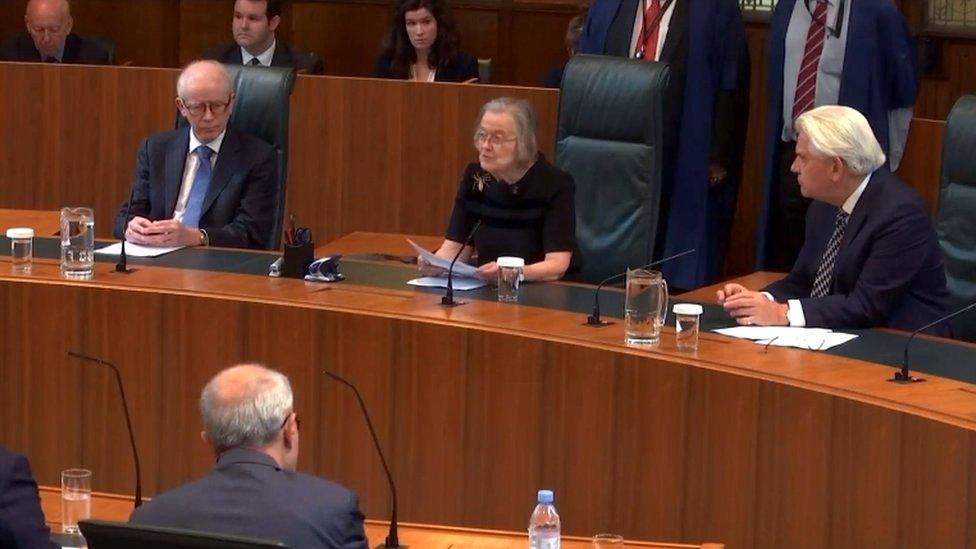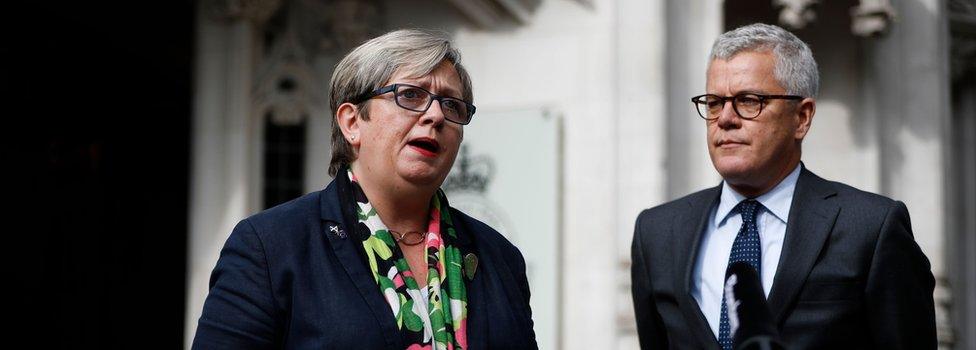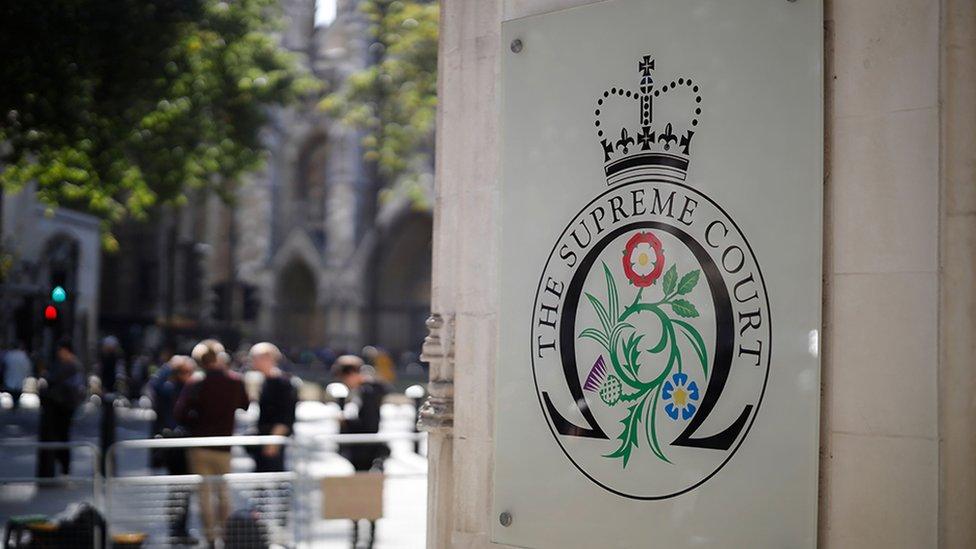Supreme Court: Nicola Sturgeon calls on Boris Johnson to resign as PM
- Published
Nicola Sturgeon: Boris Johnson continuing as PM is "unthinkable"
Scotland's first minister has called on Boris Johnson to resign after the Supreme Court ruled that his decision to suspend Parliament was unlawful.
Nicola Sturgeon said the ruling was the most significant constitutional judgement in her lifetime.
And she said it would be "unthinkable" for the prime minister to remain in office under the circumstances.
Mr Johnson, who is currently in the US, told the BBC he "strongly disagrees" with the ruling but will "respect" it.
The prime minister suspended Parliament - a process known as proroguing - for five weeks earlier this month.
He claimed it was done so he could set out his government's new policies in a Queen's Speech.
But the 11 Supreme Court judges were unanimous in ruling that it was unlawful for Mr Johnson to stop MPs carrying out their duties ahead of the UK leaving the EU on 31 October.
Supreme Court president Lady Hale said: "The decision to advise Her Majesty to prorogue Parliament was unlawful because it had the effect of frustrating or preventing the ability of Parliament to carry out its constitutional functions without reasonable justification."
She said the suspension of Parliament had therefore had an "extreme" effect on the fundamentals of democracy.
Allow X content?
This article contains content provided by X. We ask for your permission before anything is loaded, as they may be using cookies and other technologies. You may want to read X’s cookie policy, external and privacy policy, external before accepting. To view this content choose ‘accept and continue’.

Responding to the verdict, Ms Sturgeon told the BBC that a "prime minister with any honour would tender his resignation", but predicted that Mr Johnson was unlikely to do so.
She added: "The Supreme Court this morning has found that the prime minister acted unlawfully and that he did so, effectively, to evade scrutiny and accountability.
"He had no good reason for doing so and he did all of this a time of political and constitutional crisis. It is genuinely exceptional and unprecedented."
Commons Speaker John Bercow has said that Parliament will reconvene at 11:30 BST on Wednesday.
Ms Sturgeon said the top priority for MPs when they return to the Commons should be ensuring that the UK does not leave the EU without a deal, and repeated her call for a general election to be held.
She also said MPs should "come together" to force Mr Johnson out of office through a vote of confidence if he does not do the "decent and honourable thing" by quitting.
The Supreme Court declared "Parliament has not been prorogued"
The first minister, who will make a statement to the Scottish Parliament later on Tuesday, added: "It is unthinkable given the rules of democracy and accountability that has been found to have acted unlawfully and is subject of that kind of judgement delivered today would stay in office.
"I think the implications and the precedent that would set would not be a good one."
Reacting to the ruling, Mr Johnson said it was an "unusual judgement", adding: "I don't think this was the right decision. The prerogative of prorogation has been used for centuries without this kind of challenge.
"There are a lot of people who basically want to stop this country from coming out of the EU and we have a Parliament that is unable to be prorogued and doesn't want to have an election. I think it is time we took things forward."
Labour leader Jeremy Corbyn has also called for Mr Johnson to quit, accusing the prime minister of showing "contempt for democracy".
And Lib Dem leader Jo Swinson said that "Boris Johnson has again proven he is not fit to be prime minister."


How will the prime minister respond?
The prime minister is in New York at the United Nations, and his team is yet to respond. But the idea that he would walk is far-fetched (for now). What seems certain though is that MPs will be sitting again in Parliament on Wednesday.
The Commons Speaker has already said they should convene urgently. Some MPs have, out of principle, already gone back to sit on the green benches. It is a different question of course to ask, for what purpose, what will they discuss.
There isn't suddenly going to be a majority in Parliament for a way out of this mess. And Boris Johnson will inevitably try to use this to his political advantage.
Do not underestimate how aggressive Number 10 might be willing to be in response to the judgement. It is possible they will fly straight back from New York to face the music, armed with what strategy is harder to read.
But the decision to suspend Parliament may just have blown up in Number 10's face.
In his two months in power, Boris Johnson has lost his first six Commons votes, broken the law by suspending Parliament and mislead the monarch.
Even for a politician who seems to enjoy breaking the rules, that is a serious charge that, only two months into office, even the most brazen Johnson backer cannot simply shrug off.

What was the Supreme Court considering?

Lady Hale and the ten other Supreme Court judges were unanimous in finding the prime minister had acted unlawfully
The ruling was made after a three-day hearing at the Supreme Court last week which dealt with two appeals - one from campaigner and businesswoman Gina Miller, the second from the government.
Mrs Miller was appealing against the English High Court's decision that the prorogation was "purely political" and not a matter for the courts.
The government was appealing against the ruling by Scotland's Court of Session that the prorogation was "unlawful" and had been used to "stymie" Parliament.
The court ruled in favour of Mrs Miller's appeal and against the government's.
How did those involved in the case react?

The SNP's Joanna Cherry said the PM's position was "untenable"
The SNP's Joanna Cherry, who led the Scottish case, said the PM's position was "untenable" and called for him to resign.
She said: "The highest court in the United Kingdom has unanimously found that his advice to prorogue this Parliament, his advice given to Her Majesty the Queen, was unlawful.
"His position is untenable and he should have the guts, for once, to do the decent thing and resign."
Mrs Miller said the ruling "speaks volumes", adding: "This prime minister must open the doors of Parliament tomorrow. MPs must get back and be brave and bold in holding this unscrupulous government to account."

The view inside the Supreme Court
By Andrew Kerr, BBC Scotland political correspondent

A little blue slip of paper marked "Judgment" granted me access to Court One of the Supreme Court.
The staff here joked they were "golden tickets".
I was here for the hearings last week and took my usual seat - a luxurious, padded green throne with pouncing lions as handrests.
Security moved into position just before 10:30 with guards blocking the well of the court in case of any protests.
"Court will rise", the usher cried and the justices filed in as a sense of anticipation filled the room.
Lady Hale, the President, took her place resplendent in a large spider brooch. Was this a coded message for a Scottish case?
Sir Walter Scott's words swirled in my head: "Oh what a tangled web we weave, When first we practise to deceive".
I'd been in the Court of Session in Edinburgh when the judges initially ruled the suspension was unlawful and there were gasps.
It was exactly the same when Lady Hale firstly declared that the issue was justiciable - a matter for the courts.
A murmur echoed round the court as journalists furiously tweeted.
There was an ever bigger gasp when she ruled the advice was unlawful. This Court has essentially upheld the Scottish ruling.